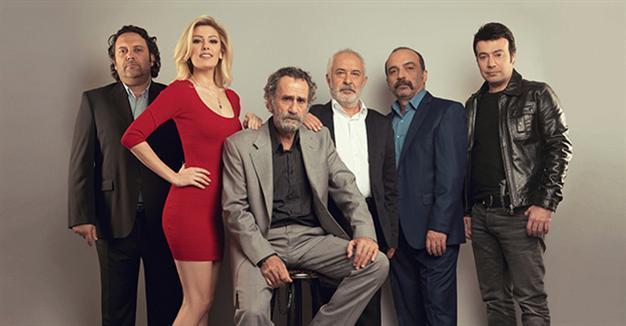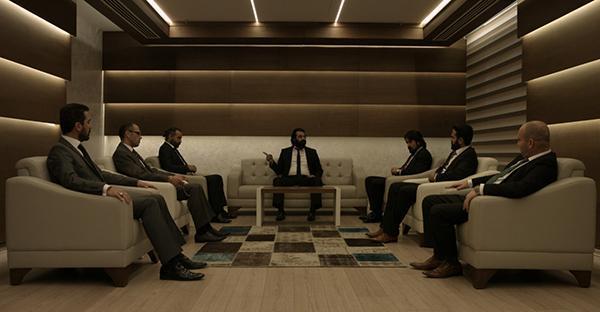The ‘nouveau macho,’ staying long past his welcome in Turkish cinema
Emrah Güler - ANKARA

“When people kill to survive, they can’t see that they themselves are dying,” says one of the dozen male characters dressed in black suits and white shirts in this week’s action film “Kadere Tutsak” (Prisoner of Destiny), directed by Erdoğan Koç. Another one says, “If a mistake threatens our system, the punishment is death.” Big words from big egos. That is something very familiar in recent Turkish cinema and TV.
Take last week’s “Babaların Babası” (The Godfather of Godfathers) by Raşit Çelikezer, where the mafia, drug lords, and money laundering are romanticized to serve a twisted sense of machismo. Small men with big guns strut around, the more macho they are, the more they are able to defy death and take home their prize of nameless, beautiful women.
Turkish audiences have come to accept this character of the nouveau macho, driven by a false sense of class and masculinity, defined by women, drugs, faux-Armani style and a new language of Turco-gangster slang. They often serve as simplistic role models for young, uneducated, unemployed, frustrated men, exemplified by the record-breaking TV and movie franchise shown over the past decade “Kurtlar Vadisi” (The Valley of the Wolves).
While most of the second-rate mafia movies in Turkish cinema are merely escapist entertainment, featuring poorly-drawn male characters with inflated egos, some noteworthy examples offer realistic portraits of the young men drawn to these characters. Aydın Bulut’s debut feature of 2009, “Başka Semtin Çocukları” (Children of the Other Side), is one of these.
Featuring young men stuck between the rural and the urban, frustrated by a system that fails to include its citizens into economic and social cycles, the film takes a vivid look at the dire consequences of male bonding and machismo in the ghettos of Istanbul. Characters wander aimlessly on the streets, inching toward total despair at finding a better life.
The macho in Turkey and abroad, old and young“Children of the Other Side” opens the door on a world where men’s friendships and their overblown sense of machismo often lead to dire consequences, coming to adorn the third page of newspapers every day. The film has much to say on the failing role of the government as “father” in the eyes of young men, and a generation stuck in between the traditions of rural Turkey and more liberal cities, striking a deep chord with many.
The world of Turkish machismo travels to three metropolises of Europe in director İnan Temelkuran’s debut feature of 2008, “Made in Europe.” Taking place over the course of a single night in Madrid, Paris and Berlin, the camera wanders with a group of Turkish immigrants (mostly men) in each city, talking as they do with one another, avoiding any predominant plot.
The characters’ conversation topics range from the mundane to the even more mundane: Refugee statuses, Silvio Berlusconi, foreign languages, domestic violence, changing technologies, and employer/employee relations. “Made in Europe” focuses on the sad existence of these men rather than their stories, conveying this through sharp, realistic and often sad dialogue.
Perhaps the Turkish film that has given the craftiest look yet at the question of machismo is Ömer Vargı’s “Kabadayı” (For Love and Honor) from 2007. Two men embodying different ideals of machismo from two different generations are juxtaposed against one another in the film. One is a retired gangster who once enforced his own rules for a sense of the greater good, while nonetheless wrecking families along the way; the other is a new-school gangster, a merciless killer and a prototype of today’s “nouveau macho.”
As different generations of men connect in “Kabadayı,” different ideals of machismo are put to the test and definitions of masculinity are questioned. Today’s sharp look of the black suit and white shirt is taken to a heightened effect in the film, with heartthrob Kenan İmirzalıoğlu in the role of the younger gangster.
Overall, taking a look at the grim picture of today’s Turkey, with the ideal of gender equality broken into pieces, the “nouveau macho” seems to be staying long past his welcome.
 “When people kill to survive, they can’t see that they themselves are dying,” says one of the dozen male characters dressed in black suits and white shirts in this week’s action film “Kadere Tutsak” (Prisoner of Destiny), directed by Erdoğan Koç. Another one says, “If a mistake threatens our system, the punishment is death.” Big words from big egos. That is something very familiar in recent Turkish cinema and TV.
“When people kill to survive, they can’t see that they themselves are dying,” says one of the dozen male characters dressed in black suits and white shirts in this week’s action film “Kadere Tutsak” (Prisoner of Destiny), directed by Erdoğan Koç. Another one says, “If a mistake threatens our system, the punishment is death.” Big words from big egos. That is something very familiar in recent Turkish cinema and TV.